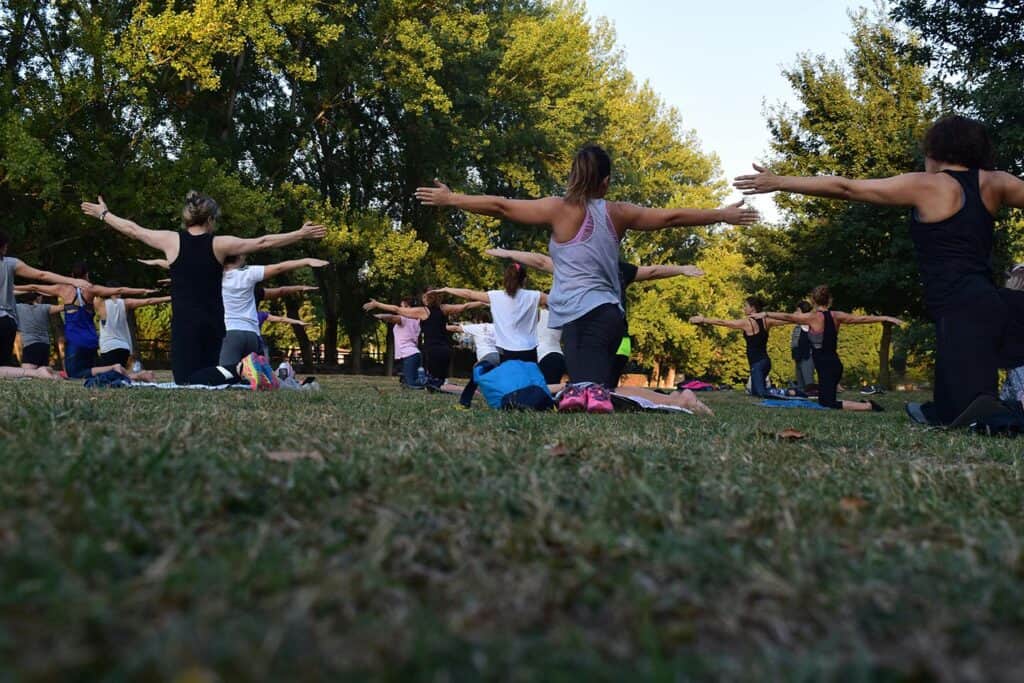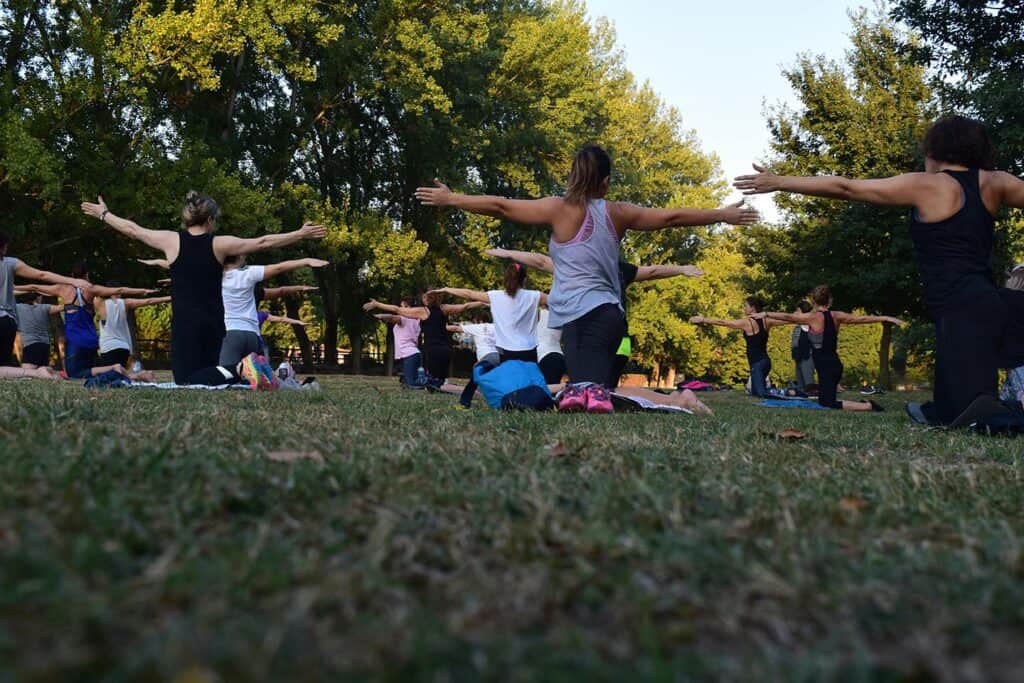

Self-love isn’t just a buzzword; it’s a transformative journey toward embracing your mind, body, and soul. In a world filled with demands and distractions, prioritizing self-care activities is essential for nurturing your sense of worth and inner peace.
Are you craving a deeper connection with yourself? Do you yearn for moments of joy and fulfillment amidst life’s chaos? You’re not alone. In fact, prioritizing self-love activities is more important now than ever before.
Welcome to a guide designed to empower you on this journey of self-discovery and self-care. As the hero of your story, it’s time to reclaim your narrative and prioritize your well-being.
Here at Life Tree Planner, we understand the challenges you face in prioritizing self-care amidst your busy life. With years of experience in empowering individuals like you, we’re here to guide you every step of the way.
In this article, we’ll delve into 12 practical and effective self-love activities that will transform your relationship with yourself. From nurturing your mind with meditation to embracing imperfectionism, we’ve got you covered.
Ready to embark on this empowering journey? Let’s dive in and discover how you can cultivate a deeper sense of self-love and fulfillment in your life.


See also Entertainment and Playtime: Finding Joy and Relaxation in Leisure Activities
Unlocking inner fulfillment requires more than just self-care; it demands a deliberate commitment to self-love activities that nurture every aspect of your being.
Here are 12 self love activities that helps you achieve inner fulfillment
- Meditation: Dedicate 10 minutes daily to quiet reflection, focusing on your breath to release stress and restore mental clarity.
- Gratitude Practice: Keep a journal, noting three things you’re grateful for each day, fostering happiness and life satisfaction.
- Physical Exercise: Invest at least 30 minutes daily in activities like walking, yoga, or gym workouts to uplift mood and enhance health.
- Learning to Say No: Practice setting boundaries, respectfully declining commitments that drain your energy and lead to burnout.
- Spending Time Alone: Carve out “me time” to engage in activities that promote self-reflection and relaxation, such as reading or nature walks.
- Setting and Achieving Goals: Break down aspirations into manageable tasks, celebrating progress as you move closer to fulfillment.
- Disconnecting from Technology: Designate periods each day to unplug, fostering stress reduction and deeper connections with loved ones.
- Setting Boundaries: Assertively communicate your needs in personal and professional relationships, safeguarding your well-being.
- Nature Walks: Immerse yourself in the beauty of the outdoors, rejuvenating your spirit and relieving stress.
- Practicing Self-Compassion: Cultivate kindness and understanding toward yourself, nurturing emotional resilience and well-being.
- Journaling: Dedicate time to writing daily reflections, enhancing self-awareness and gaining clarity on emotions and goals.
- Letting Go of Perfectionism: Embrace imperfection, learning from setbacks and treating yourself with compassion and acceptance.
Definition of Self Love

Self-love is the cornerstone of mental well-being, encompassing practices that nurture one’s sense of self-worth and acceptance. It involves engaging in activities that prioritize self-care, such as spending time on hobbies, indulging in a funny movie, or writing a love letter to oneself.
These esteem activities are not just about pampering; they’re about having positive self-talk, boosting self-confidence, and breaking free from negative thought patterns.
Through acts of gratitude and creating a sense of fulfillment, individuals can cultivate a deeper connection with themselves, ultimately leading to improved self-esteem and a greater sense of inner peace. Self-love isn’t selfish; it’s an essential component of a healthy and fulfilling life.
Practical and Effective Activities

Discovering practical and effective self-love activities is essential for nurturing a healthy sense of self-esteem and happiness. From simple practices like meditation to indulging in artistic endeavors, there are numerous ways to cultivate self-love.
Taking regular walks in nature, engaging in creative arts, or simply taking time to listen to one’s inner voice can help feelings of confidence and self-worth. Whether it’s posting words of kindness, engaging in acts of generosity, or starting a gratitude journal, these actions can all contribute to a more positive self-image.
By beginning these practices today, individuals can step into the world of self-discovery and unlock a newfound sense of inner peace and fulfillment, regardless of age or background. Here are 12 interesting exercises for self love:
1. Meditation

Meditation serves as a profound self-love activity, nurturing our self-esteem and inner well-being. By dedicating time to quiet reflection, we physically and emotionally accept ourselves and our feelings without judgment. In the stillness of meditation, we can tune into the truth of our lives, letting go of worries and accepting the present moment.
Meditation books give us an opportunity to listen to the whispers of our soul and connect with the essence of our being. Through deep meditation, we celebrate the acceptance of ourselves, finding joy in the simplicity of existence and the beauty of nature.
It’s a fun and transformative journey where we rest, reflect, and emerge with a deeper sense of self-love and appreciation for the richness of our lives. Here are the 5 most important reasons why meditation is crucial as a self-love activity, presented concisely:
- Promotes Mindfulness: Enhances present-moment awareness, fostering a deeper connection with yourself.
- Reduces Stress: Lowers stress levels, promoting calmness and relaxation in daily life.
- Enhances Self-Acceptance: Cultivates self-awareness and compassion, fostering acceptance of yourself.
- Improves Mental Well-being: Alleviates anxiety and depression symptoms, fostering mental clarity and stability.
- Boosts Self-Esteem: Nurtures positive self-talk and affirmations, enhancing self-esteem and self-worth.
See also Shower Meditation: 8 Steps to Inner Peace and Relaxation
2. Gratitude Practice

Gratitude practice serves as a profound self-love activity, nurturing self-esteem and encouraging a positive sense of self love. By dedicating time to write down moments of gratitude, individuals create a connection with the positive aspects of their lives, a sense of awareness and well-being.
It’s not just about listing ideas but about genuinely connecting with the moments that make a difference. Through this practice, one can create a ripple effect of positivity, enhancing their overall sense of wellness and deepening their appreciation for themselves and the world around them.
Here’s a short list of how to practice gratitude:
- Keep a Gratitude Journal: Write down three things you’re grateful for each day.
- Express Appreciation: Verbally thank others or write thank-you notes for their kindness.
- Notice the Little Things: Pay attention to small moments of joy and beauty in your daily life.
- Focus on Blessings: Reflect on the positive aspects of your life, even during challenging times.
- Count Your Blessings: Take time to regularly appreciate and acknowledge the good things in your life.
3. Physical Exercise

Engaging in physical exercise isn’t just about fitness—it’s a powerful act of self-love. By prioritizing self-care through movement, individuals cultivate a positive relationship with their bodies, enhancing both physical and mental well-being. Whether it’s a brisk walk in nature or a yoga session in the comfort of home, these activities break free from limitations, empowering individuals to feel good inside and out.
Regular exercise not only boosts self-confidence but also focuses the mind, promoting clarity and positivity in daily life. It’s a tangible expression of self-love, instilling a sense of empowerment and vitality that resonates throughout one’s adventure towards a healthier, happier self.
Here are the top 5 reasons why physical exercise is crucial as a self-love activity, succinctly listed:
- Boosts Mood: Exercise releases endorphins, improving mood and reducing feelings of stress and anxiety.
- Increases Energy Levels: Regular physical activity enhances energy levels, promoting overall vitality and well-being.
- Improves Self-Confidence: Achieving fitness goals boosts self-confidence and fosters a positive self-image.
- Enhances Sleep Quality: Exercise promotes better sleep patterns, leading to improved physical and mental health.
- Fosters Self-Love: Engaging in regular exercise is an act of self-love, demonstrating care and appreciation for your body and well-being.
4. Learning to Say No

Learning to say no is an essential act of self-love, a moment to pause and honor our own needs. It’s a chance to rest without worry, allowing our souls to reflect and find acceptance in our limitations. Saying no can be empowering, freeing us to engage in activities that truly nourish our spirits and bring us joy.
It’s about hearing the truth within ourselves and celebrating our nature without guilt or hesitation. Through this practice, we connect deeply with our inner selves, encouraging a difference in how we approach life. So let’s start saying no as a self-love activity, and write our own ideas of awareness and self-empowerment.
Here’s a short list of how to say no:
- Be Direct: Politely decline without over-explaining.
- Be Honest: Provide a brief reason if necessary.
- Offer Alternatives: Suggest compromises if possible.
- Stay Calm: Maintain composure and assertiveness.
- Prioritize Yourself: Stick to your boundaries and prioritize your well-being.
5. Spending Time Alone

Spending time alone is a quintessential self-love activity that creates mental health and overall well-being. It’s a chance to rest, reflect, and recharge, indulging in activities that bring joy and fulfillment. Whether it’s writing in a journal, creating art, or simply enjoying a funny movie, solo time allows for self-discovery and personal growth.
Engaging in positive self-talk and focusing on moments of self-love can significantly boost confidence and inner peace. It’s an opportunity to prioritize oneself, to celebrate the uniqueness of life, and to cultivate a deeper connection with one’s own emotions and desires.
So, start writing that love letter to yourself and initiate the empowering tour of spending time alone as a vital self-love habits. Here are five reasons why spending time alone is essential as a self-love activity:
- Clarity of Mind: Solitude offers a space free from distractions, allowing for clear thinking and decision-making.
- Emotional Healing: A safe environment to process emotions, heal from past wounds, and nurture inner peace.
- Creative Expression: Fosters creativity and self-expression, encouraging exploration of artistic pursuits and projects.
- Personal Growth: Facilitates self-improvement by challenging comfort zones and helping self-awareness.
- Autonomy: Cultivates a sense of independence and self-reliance, empowering individuals to trust their own instincts and judgment.
6. Setting and Achieving Goals

Setting and achieving goals is a powerful self-love activity that encompasses various aspects of personal development. By creating goals aligned with our values and desires, we step on an adventure toward greater happiness and fulfillment.
Whether it’s pursuing an artistic passion, advancing in school or career, or simply taking time to enjoy activities we love, setting and achieving goals nurtures a sense of purpose and accomplishment.
It also instills a feeling of self-worth and confidence as we actively listen to our needs and take proactive steps toward meeting them. Whether it’s starting a meditation practice, going for a daily walk, or indulging in a favorite hobby, the importance lies in consistently practicing self-love through goal-setting and action.
Here’s a short list of how to set and achieve goals:
- Define Objectives: Make specific, achievable goals.
- Break Into Steps: Divide goals into manageable tasks.
- Plan: Create a detailed action plan.
- Stay Motivated: Visualize success and celebrate progress.
- Adapt and Persist: Adjust as needed and stay committed.
See also Work-Life Balance: Strategies for Achieving Harmony in Work and Life
7. Disconnecting from Technology

In today’s digital age, disconnecting from technology can be a powerful act of self-love. By stepping away from screens, we create space to reconnect with ourselves and nurture our self-esteem. It’s an opportunity to rediscover the beauty of the world around us, to begin writing our own narrative, and to engage in acts of kindness both for ourselves and others.
Free from the constant barrage of notifications, we can focus on the present moment, building confidence through positive self-talk and gratitude. Disconnecting allows us to see life’s simple pleasures and cultivate a deeper sense of inner peace and hope.
Here’s a short list of 5 benefits of disconnecting from technology:
- Reduced Stress: Disconnecting from technology can lower stress levels and promote relaxation.
- Improved Sleep: Less screen time before bed can lead to better sleep quality and overall well-being.
- Increased Productivity: Disconnecting allows for greater focus and concentration, leading to improved productivity.
- Enhanced Relationships: It helps deeper connections with others and strengthens relationships.
- Greater Mindfulness: It encourages mindfulness and presence in the moment, leading to a more fulfilling life.
8. Setting Boundaries

Setting boundaries is a crucial self-love activity that bolsters self-esteem and self-confidence. It’s not just about saying no; it’s about teaching kids and ourselves the importance of self-care and respecting personal limits. By establishing boundaries, we break free from the cycle of overextending ourselves and feeling drained.
Moreover, it teaches children how to treat themselves and others with respect, confidence, and healthy relationships. Practicing boundary-setting is an ongoing process that empowers us to prioritize our wellness, assert our needs, and live authentically. It’s a cornerstone of self-love activities that cultivates resilience and a sense of inner peace.
Here’s a list of 5 tips for setting boundaries:
- Identify Limits: Know your boundaries.
- Communicate Clearly: Express boundaries directly.
- Enforce Boundaries: Assertively uphold them.
- Prioritize Self-Care: Put yourself first.
- Review and Adjust: Periodically reassess.
9. Nature Walks

Nature walks are the perfect self-love activity, offering a free and accessible way to practice self-love while boosting self-esteem. As you walk, listen to the soothing sounds of nature and bask in the beauty around you, feeling physically and mentally rejuvenated.
Engaging in this fun and fulfilling activity allows you to connect with the natural world, promoting positive feelings and a sense of well-being. Here’s a list of benefits of nature walks:
- Reduced Stress: Nature walks relax and lower stress.
- Improved Mood: Boosts mood and well-being.
- Physical Activity: Provides exercise and health benefits.
- Enhanced Creativity: Sparks creativity and mental clarity.
- Connection with Nature: Fosters mindfulness and inner peace.
10. Practicing Self-Compassion

Practicing self-compassion entails engaging in self-love activities that nurture positive feelings toward oneself. Take time to reflect on the positive things in life and spend moments writing or creating art that evokes joy and fulfillment. Whether it’s jotting down a love letter to yourself or simply starting a gratitude journal, these practices can help you feel good from within.
Among life’s challenges, focus on what you’re grateful for, a sense of appreciation and contentment. By incorporating such self-love activities into your routine, you can cultivate a deeper connection with yourself and navigate life with compassion and resilience. Here are 5 tips to practice self-compassion:
- Speak Kindly: Replace self-criticism with kindness.
- Be Present: Practice mindful acceptance of thoughts and feelings.
- Embrace Imperfections: Accept flaws as part of being human.
- Set Boundaries: Protect your well-being and honor your needs.
- Seek Support: Reach out for guidance and encouragement.
11. Journaling

Journaling serves as a cornerstone in self-love activities, offering a space to practice self-love and discover one’s innermost thoughts and feelings. Through the act of writing, individuals can pinpoint self-esteem activities that encourage personal growth and celebrate accomplishments, making the process both fun and rewarding.
Journaling provides a platform to hear and validate one’s own voice, creating a sense of empowerment and confidence. Additionally, it serves as a valuable tool to teach kids about self-expression and self-discovery, helping them become more confident individuals.
By watching their progress and practicing positive self-talk, individuals can begin to see the transformative power of words and post-affirmations to reinforce self-love.
Here’s a short list of how to start journaling:
- Get a Journal: Purchase or designate a notebook for journaling.
- Set Aside Time: Allocate a few minutes each day for journaling.
- Start Writing: Begin with prompts, thoughts, or reflections.
- Be Consistent: Make journaling a regular habit.
- Reflect and Review: Revisit entries to track progress or insights.
12. Letting Go of Perfectionism

Letting go of perfectionism is a transformative journey where we celebrate progress rather than a flawless point. It’s about discovering the beauty in imperfection, understanding that life isn’t about meeting an unattainable standard but following authenticity.
By taking care of ourselves and practicing self-love, we become more confident in our abilities and interests. Whether it’s like spending time with loved ones, pursuing hobbies, or simply being grateful for the positive things in life, we create a more fulfilling existence.
Here is a list of how to let go of perfectionism:
- Accept Imperfections: Embrace flaws and let go of unrealistic standards.
- Set Realistic Goals: Replace perfectionism with achievable aims.
- Be Kind to Yourself: Practice self-compassion when things don’t go as planned.
- Celebrate Progress: Focus on growth rather than flawless outcomes.
- Find Encouragement: Seek support from friends, family, or a mentor.
Importance of Self-Love Activities

Engaging in self-love activities is paramount in today’s fast-paced world. They serve as a focal point for individuals to discover and nurture their own worth and interest. By dedicating time to practicing self-love, individuals become more confident in themselves and their abilities, taking proactive steps towards self-care and personal growth.
Whether it’s trying to write affirmations, indulge in hobbies, or simply treat oneself with kindness, these activities create a sense of fulfillment and satisfaction in life.
Especially in the demanding environment of school or work, which is a treat, prioritizing self-love activities can alleviate stress and promote a healthier mindset, ultimately leading to a more balanced and fulfilling life and feeling wonderful.
See also Family Bonding: Strengthening Family Connections and Relationships
Self Love Activities: A Recap

Incorporating self-love activities into daily routines is essential for overall well-being. While it’s important to practice self-love, it’s equally vital to spend time on other activities that bring joy and fulfillment. Whether it’s pursuing hobbies, spending time with loved ones, or engaging in creative outlets, these endeavors enrich life and nurture the soul.
Additionally, being grateful for the little things and treat oneself with kindness can have a profound impact on mental and emotional health. So, while it’s important to watch out for self-care, remember to have a holistic approach to self-love that encompasses various aspects of life beyond school or work.


